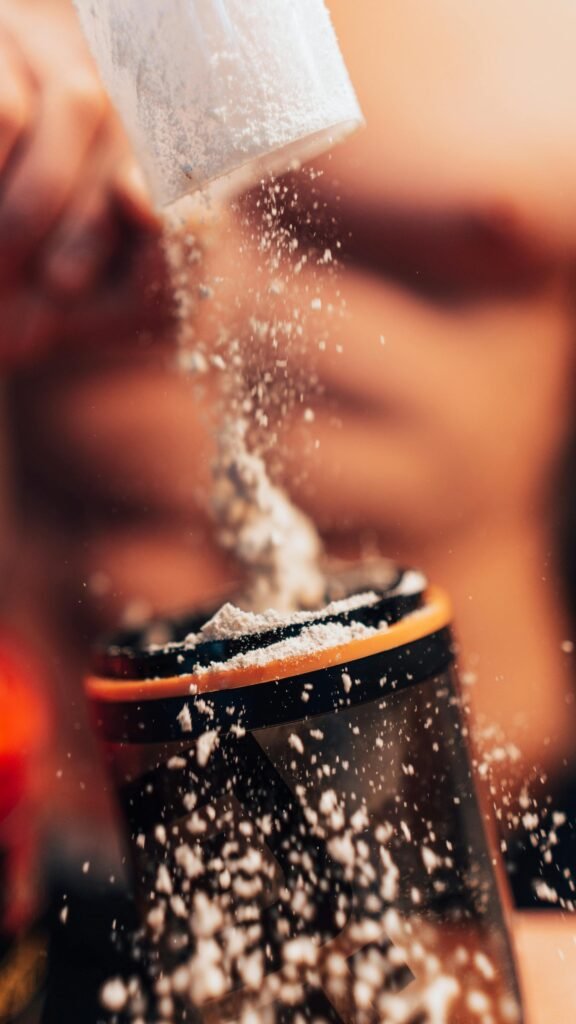When it comes to building muscle, protein plays an essential role in growth and recovery. It serves as the foundation for anyone looking to maximize muscle gains. While whole foods are a vital source of protein, the best protein powder to build muscle has become a go-to supplement for athletes and fitness enthusiasts alike. Offering convenience, high-quality protein, and a quick solution to meet daily intake requirements, the best protein powder to build muscle can significantly enhance your results. However, with so many options on the market, choosing the right one can feel overwhelming. Should you opt for whey, casein, or plant-based protein? How can you ensure that your choice will effectively support muscle growth? In this guide, we will break down the various types of protein powders, key factors to consider, and recommend the best protein powder to build muscle available today.
Why Protein is Crucial for Muscle Growth
Protein’s Role in Muscle Repair
Protein plays a vital role in muscle repair and growth, especially after strenuous workouts. The body requires protein to rebuild muscle fibers, making them stronger through muscle protein synthesis. Choosing the best protein powder for muscle growth ensures that your muscles receive the essential nutrients needed to recover and grow efficiently. Among these vital nutrients are branched-chain amino acids (BCAAs), which are often found in high concentrations in the best protein powders for muscle-building purposes.
When you consume protein, your body breaks it down into amino acids, which serve as the building blocks of muscle tissue. BCAAs, such as leucine, isoleucine, and valine, play a particularly important role in this process. They directly stimulate muscle repair and growth, ensuring your muscles recover quickly after intense exercise. Without sufficient protein, your body cannot rebuild muscle tissue effectively, leading to slower progress in muscle development. Incorporating the best protein powders for muscle growth into your routine is essential for achieving optimal results.
Daily Protein Requirements for Muscle Building
For optimal muscle growth, your daily protein intake must be sufficient to support recovery and muscle repair. Experts generally recommend consuming 1.6 to 2.2 grams of protein per kilogram of body weight per day, depending on your activity level and fitness goals.
For instance, someone weighing 70 kg (approximately 154 lbs) should aim for 112 to 154 grams of protein daily to maximize muscle growth. While it’s possible to achieve this intake through whole foods, protein powders offer a convenient way to meet these higher requirements, especially when eating enough whole foods proves challenging.
Types of Protein Powders for Muscle Growth
Whey Protein
Whey protein is the most popular and commonly used type of protein powder for muscle building. It is considered a complete protein, meaning it contains all nine essential amino acids, including a high concentration of BCAAs. Derived from milk, whey protein is known for its fast absorption rate, making it ideal for post-workout recovery when your muscles need protein quickly. For those seeking the best protein powder to build muscle, whey protein stands out due to its superior digestibility and effectiveness. Its various forms, such as whey concentrate, whey isolate, and hydrolyzed whey, offer different benefits, but all serve as top contenders when looking for the best protein powder to build muscle.
Whey protein comes in various forms:
- Whey concentrate: Contains some fat and lactose, offering a balanced and affordable option.
- Whey isolate: More refined, with less fat and lactose, ideal for those who are lactose intolerant.
- Hydrolyzed whey: Pre-digested for even faster absorption.
Numerous studies have shown that whey protein is effective in promoting muscle mass and strength when combined with resistance training.
Casein Protein
In contrast to whey, casein protein digests more slowly, providing a sustained release of amino acids over several hours. Like whey, casein is also derived from milk, but it’s absorbed more gradually, making it ideal for nighttime consumption. Since your body is fasting during sleep, casein offers a steady stream of amino acids to fuel muscle recovery while you rest.
Research suggests that while casein digests slowly, it can be just as effective as whey in promoting muscle growth when used at the right times. Many athletes take casein before bed to ensure their muscles receive enough protein during the overnight recovery phase.
Plant-Based Protein
For those following a vegan or dairy-free diet, plant-based protein powders offer an excellent alternative. Common sources include pea, hemp, brown rice, and soy. While some plant-based proteins are incomplete (lacking one or more essential amino acids), many blends combine different plant sources to provide a complete amino acid profile.
For example, pea protein has become popular for its high BCAA content, making it comparable to whey in terms of muscle-building potential. Additionally, plant-based protein powders tend to be easier to digest for individuals with dairy intolerances.
Factors to Consider When Choosing a Protein Powder
Choosing the right protein powder is essential for muscle building, but with so many options available, it’s important to consider key factors that will impact your results. Here are the most important things to keep in mind:
Protein Content Per Serving
Choosing the right protein powder is essential for muscle building, but with so many options available, it’s important to consider key factors that will impact your results. One of the most critical factors is the amount of protein per serving. To support muscle growth, aim for the best protein powder to build muscle that provides 20-30 grams of protein per serving. This ensures you’re getting enough protein to promote muscle repair and growth after workouts. Always check the label to ensure that the protein content aligns with your daily intake goals and helps you select the best protein powder to build muscle.
Amino Acid Profile
The amino acid profile of a protein powder is crucial for muscle recovery and growth. Look for powders that are rich in essential amino acids (EAAs), especially BCAAs like leucine, which directly stimulates muscle protein synthesis.
- Whey protein is naturally high in BCAAs, making it a great option for muscle recovery.
- Plant-based proteins may require blending to ensure they provide a complete range of amino acids. Some plant-based options already contain a balanced profile by combining sources like pea and rice.
Ensuring your protein powder has the necessary amino acids will maximize its effectiveness for muscle repair and growth.
Absorption Rate and Digestibility
The absorption rate and digestibility of a protein powder can also affect its impact on muscle building.
- Whey protein is known for its fast absorption, making it ideal for post-workout recovery when your muscles need nutrients quickly.
- Casein protein is absorbed more slowly, providing a steady release of amino acids, which is ideal for nighttime use or extended periods between meals.
Digestibility is another factor, particularly for those with dietary restrictions or sensitivities. For example, individuals with lactose intolerance may prefer whey isolate, which has minimal lactose, or a plant-based alternative.
Top Protein Powders for Building Muscle in 2024
With a vast range of protein powders available on the market, it’s essential to choose a product that fits your specific needs in terms of quality, effectiveness, and taste. Below are some of the best protein powders for building muscle in 2024, broken down by type:
Best Whey Protein Powders
Optimum Nutrition Gold Standard Whey
One of the most trusted whey protein powders, Optimum Nutrition Gold Standard Whey offers 24 grams of protein per serving and is rich in BCAAs. Its smooth texture and mixability make it a popular choice among athletes and bodybuilders. This product is ideal for post-workout recovery and is available in a variety of flavors.
Dymatize Iso100 Hydrolyzed Whey
Dymatize Iso100 is a hydrolyzed whey protein isolate, which means it has been broken down into smaller peptides for faster digestion. With 25 grams of protein per serving and nearly zero fat or carbs, it’s perfect for building lean muscle without adding unnecessary calories. It’s also lactose-free, making it a great option for those with lactose intolerance.
MuscleTech NitroTech Whey Gold
Formulated with whey protein isolate and peptides, NitroTech Whey Gold supports rapid muscle repair and growth. With 24 grams of protein per serving, it helps accelerate recovery after intense workouts. The blend of whey isolate and peptides enhances absorption, making it an excellent choice for muscle-building enthusiasts.
Best Plant-Based Protein Powders
Orgain Organic Plant-Based Protein
Orgain’s Organic Plant-Based Protein offers 21 grams of protein per serving, derived from a blend of pea, brown rice, and chia seeds. It’s organic, non-GMO, and free from soy and gluten, making it suitable for those with dietary restrictions. While some plant-based proteins can have a gritty texture, Orgain’s smooth consistency makes it a great option for vegan athletes.
Garden of Life Raw Organic Protein
Garden of Life is known for its high-quality plant-based ingredients. This protein powder provides 22 grams of protein per serving from sprouted organic peas, chia seeds, and quinoa. It also contains digestive enzymes and probiotics, which can help with nutrient absorption and gut health, making it ideal for those with sensitive stomachs.
Vega Sport Premium Protein
Designed specifically for athletes, Vega Sport Premium Protein delivers 30 grams of plant-based protein per serving, sourced from pea and pumpkin seeds. It also contains performance-boosting ingredients like tart cherry for recovery and turmeric to help reduce inflammation. This makes Vega Sport an excellent option for vegans who want to build muscle and reduce recovery time after tough workouts.
Best Casein Protein Powders
Ascent Native Fuel Micellar Casein
Ascent’s Micellar Casein provides 25 grams of slow-digesting protein per serving, making it perfect for overnight muscle recovery. With minimal additives and a clean ingredient profile, this protein powder is a top choice for those who want an effective and natural option for sustained muscle growth.
Optimum Nutrition Gold Standard Casein
This casein powder offers 24 grams of slow-digesting protein per serving, specifically designed to release amino acids gradually over time. It’s ideal for nighttime use or between meals to ensure that your muscles have a continuous supply of protein for repair and growth.
Dymatize Elite Casein
With 25 grams of protein per serving, Dymatize Elite Casein is formulated for long-lasting amino acid release. It’s high in BCAAs and glutamine, both of which are essential for muscle recovery and growth. This extended-release protein powder is perfect for those looking to build muscle while they sleep.
How to Maximize Muscle Gain with Protein Powder
Incorporating protein powder into your routine can significantly boost your muscle-building efforts, but timing and usage are key. Here are some tips on how to use protein powder for maximum results:
Post-Workout Protein Timing
Timing your protein intake is crucial for optimizing muscle recovery. The most important time to consume protein is within 30-60 minutes after a workout, during the “anabolic window,” when your muscles are primed to absorb nutrients. Fast-digesting proteins like whey are ideal during this period because they deliver amino acids to the muscles quickly, kickstarting the repair process.
Aim to consume 20-30 grams of protein immediately after your workout to maximize muscle protein synthesis and recovery.
Pre-Workout and Bedtime Protein
While post-workout protein is essential, consuming protein before your workout and at bedtime can also support muscle growth. Pre-workout protein ensures your body has the amino acids it needs to prevent muscle breakdown during exercise. On the other hand, taking a slow-digesting protein like casein before bed provides a steady stream of amino acids throughout the night, aiding in muscle recovery as you sleep.
If you’re taking protein before a workout, consider a mix of fast and slow-digesting proteins to cover both immediate and long-term needs.
Using Protein Powder as a Meal Replacement
Protein powders can also be used as meal replacements to help you meet your daily protein goals. Blending protein powder with nutrient-dense ingredients like fruits, vegetables, and healthy fats can create a balanced meal that supports muscle growth. This is especially useful for those who have busy schedules and find it challenging to prepare high-protein meals throughout the day.
Common Myths About Protein Powders
Despite the widespread use of protein powders, many myths and misconceptions surround their role in muscle building. Here are a few common myths and the facts behind them:
Myth: More Protein Equals More Muscle
One of the most persistent myths is that consuming excessive amounts of protein will automatically result in more muscle gain. While protein is essential for muscle growth, consuming more than your body can use doesn’t lead to faster muscle development. Your body can only absorb and utilize a certain amount of protein at a time, and any excess will either be stored as fat or excreted.
It’s important to follow the general recommendation of 1.6 to 2.2 grams of protein per kilogram of body weight per day and balance your protein intake with other macronutrients such as carbs and fats, which also contribute to muscle growth and overall health.
Myth: Protein Powders Cause Weight Gain
Some people believe that protein powders will lead to unwanted weight or fat gain. However, this only occurs if you consume more calories than you burn. Protein powder, when used as part of a balanced diet, can help build lean muscle without increasing body fat.
The key is maintaining a caloric balance or deficit, depending on your goals. If you’re using protein powder in moderation and exercising regularly, it can help you build muscle without causing weight gain.
Who Should Use Protein Powder?
Protein powders can be highly effective for a range of people looking to build muscle, but their use and benefits can vary depending on your training level, goals, and dietary preferences. Here’s a breakdown of who benefits most from protein powder supplementation:
Beginners vs. Advanced Athletes
For beginners, protein powder can serve as a useful tool to ensure they meet their daily protein needs, especially if they aren’t used to consuming a high-protein diet. Starting out in strength training requires consistent protein intake to fuel muscle recovery and growth after workouts. Protein powders are convenient and help beginners meet their intake goals.
For advanced athletes, particularly those with intense training schedules, protein powders are often necessary to meet higher protein requirements. These athletes place more physical demands on their bodies, and protein supplementation helps support muscle recovery and growth. In this case, fast-absorbing whey protein after workouts and slow-digesting casein before bed can be beneficial for continuous muscle protein synthesis.
Bodybuilders vs. Casual Gym-Goers
Bodybuilders, who aim to increase muscle mass while minimizing fat, have very specific protein requirements. For them, protein powders like whey and casein are essential tools for meeting their high protein needs with minimal fat and carbohydrates. Protein timing is also critical, with fast-digesting whey consumed post-workout and slow-digesting casein taken before bed to support overnight muscle recovery.
Casual gym-goers, who might only aim to gain moderate muscle or maintain fitness, may not need as much protein as bodybuilders, but protein powder can still help fill gaps. For those who work out regularly but struggle to consume enough protein from whole foods, a simple whey or plant-based protein shake after exercise can support muscle repair and maintenance without the need for complex meal planning.
Vegetarians, Vegans, and Those with Dietary Restrictions
For vegetarians and vegans, getting enough high-quality protein from diet alone can be challenging, particularly when aiming to build muscle. While plant-based protein sources like lentils, beans, and quinoa are great, they often lack a complete amino acid profile. Plant-based protein powders made from pea, brown rice, or hemp can fill this gap, offering a balanced amino acid profile to support muscle growth.
Additionally, individuals with lactose intolerance or gluten sensitivity can benefit from lactose-free whey isolate or plant-based proteins, which provide the muscle-building benefits of traditional protein powders without the digestive discomfort.
Benefits of Using Protein Powders for Muscle Building
While protein powders offer convenience, they also bring a range of benefits that can significantly aid muscle-building efforts. Here’s why protein powder supplementation can help you reach your goals faster:
Convenience and Flexibility
One of the biggest advantages of protein powder is the convenience it offers. Preparing a high-protein meal from whole foods can be time-consuming, especially for people with busy lifestyles. Protein powders allow you to quickly consume a high-protein shake or snack to meet your protein goals.
Protein powders are also highly versatile. You can blend them into shakes, smoothies, or even incorporate them into recipes like protein pancakes or oatmeal, providing flexibility to suit your dietary preferences.
Faster Recovery
Protein powders, particularly fast-absorbing options like whey, are highly effective for speeding up muscle recovery after intense workouts. Post-exercise, your muscles are primed to absorb nutrients, and protein shakes help deliver amino acids directly to your muscles, ensuring quick repair and less soreness.
By using protein powder after workouts, you can recover faster, allowing you to train more frequently and with greater intensity—ultimately supporting better muscle-building results.
Increased Muscle Mass
For those aiming to increase muscle mass, protein powders provide a concentrated source of protein that helps promote muscle growth when combined with resistance training. Studies consistently show that individuals who use protein powder in conjunction with weight training experience greater gains in muscle mass compared to those who rely on whole food alone.
With high-quality protein powders such as whey, casein, or plant-based options, you ensure that your muscles are getting the essential amino acids needed for muscle protein synthesis, helping you build stronger, leaner muscles over time.
Potential Side Effects of Protein Powder Use
While protein powders are generally considered safe, especially when used as part of a balanced diet, there are a few potential side effects and risks to be aware of, particularly for individuals with specific dietary sensitivities or health conditions.
Digestive Issues
Some individuals may experience digestive discomfort when consuming protein powders, especially those containing lactose. Whey protein concentrate, which contains more lactose, can cause bloating, gas, or stomach cramps in people who are lactose intolerant.
For those sensitive to lactose, whey protein isolate (which contains very little lactose) or plant-based protein powders are better alternatives. Additionally, protein powders that include digestive enzymes can help improve digestibility and prevent stomach discomfort.
Kidney Health Concerns
There has been some debate about whether high-protein diets, including protein powder use, can harm kidney health. Some believe that too much protein may place strain on the kidneys, particularly for individuals with pre-existing kidney conditions.
For healthy individuals, however, research has shown that high-protein diets do not negatively affect kidney function. If you have kidney disease or compromised kidney function, it’s important to consult a healthcare provider before increasing protein intake.
Allergic Reactions
Certain protein powders, such as those containing dairy or soy, may trigger allergic reactions in sensitive individuals. For example, people with dairy allergies should avoid whey protein and instead opt for egg white or plant-based protein powders.
Always read the ingredient labels carefully if you have food allergies and choose hypoallergenic protein powders designed for people with sensitivities.
How to Combine Protein Powders with Other Supplements for Muscle Gain
While protein powders are highly effective on their own, combining them with other supplements can further enhance muscle growth and recovery. Here are some of the most popular supplements to use alongside protein powder to maximize your results:
Creatine
Creatine is one of the most well-researched and effective supplements for increasing muscle strength, size, and overall performance. It works by replenishing ATP (adenosine triphosphate) stores in your muscles, which are used for short bursts of energy during intense exercises like weightlifting or sprinting.
When combined with protein powder, particularly post-workout, creatine can improve muscle recovery and help build more muscle mass. Many athletes take 5 grams of creatine per day, typically in their post-workout shake along with protein. Creatine monohydrate is the most widely studied and recommended form.
Branched-Chain Amino Acids (BCAAs)
While most protein powders, especially whey, are already rich in BCAAs (branched-chain amino acids), adding a BCAA supplement can be beneficial, particularly during long or intense workouts. BCAAs, which include leucine, isoleucine, and valine, are essential for preventing muscle breakdown and improving muscle recovery.
If your protein powder is low in BCAAs, or if you’re doing especially intense training, supplementing with additional BCAAs can help reduce muscle soreness and enhance muscle repair. BCAAs are commonly taken before or during workouts to prevent muscle catabolism (breakdown).
Pre-Workout Supplements
Pre-workout supplements are designed to boost energy, focus, and endurance during exercise. They typically contain ingredients like caffeine, beta-alanine, and citrulline malate, which help improve performance and delay fatigue. While pre-workouts don’t directly contribute to muscle protein synthesis, they allow you to train harder and longer, indirectly supporting muscle growth.
Taking a pre-workout supplement 30 minutes before training, followed by a protein shake post-workout, can help maximize your workout efforts and recovery.
Protein Powder Alternatives for Muscle Building
While protein powders are a convenient way to meet your protein needs, there are other effective alternatives that can provide the necessary protein for muscle growth. Here are some top alternatives for those who prefer whole foods or pre-made options:
Whole Foods Rich in Protein
Whole foods are an excellent source of high-quality protein and should form the foundation of your diet. If you prefer to focus on whole food sources of protein, here are some of the best options for building muscle:
- Chicken Breast: A lean source of protein with about 30 grams of protein per 100 grams, making it ideal for muscle building.
- Eggs: A complete protein containing all essential amino acids. A large egg provides around 6 grams of protein.
- Fish (Salmon, Tuna, etc.): Not only rich in protein but also high in omega-3 fatty acids, which help with muscle recovery and inflammation reduction.
- Greek Yogurt: Offers about 10 grams of protein per 100 grams and also contains probiotics for gut health.
- Lentils and Beans: Great plant-based protein sources, with cooked lentils providing around 18 grams of protein per cup.
Incorporating these foods into your daily meals ensures you’re getting a variety of nutrients that support overall health and muscle growth.
Protein Bars and Ready-to-Drink Shakes
For those looking for convenience without having to mix a powder, protein bars and ready-to-drink (RTD) shakes are excellent alternatives. These products offer a portable source of protein that can be consumed on the go.
- Protein Bars: Many bars contain 20-30 grams of protein per serving, making them a good post-workout snack or meal replacement. Look for bars with balanced macronutrients and minimal added sugars.
- Ready-to-Drink Shakes: Pre-made shakes typically offer 20-30 grams of protein per bottle and are available in a variety of flavors. These are ideal for people who need a quick and easy protein source when they don’t have time to prepare a meal.
While these options are convenient, always check the labels for added sugars, artificial ingredients, or preservatives, and opt for products with high-quality ingredients.
How to Choose the Best Protein Powder for Your Body Type and Goals
Choosing the right protein powder can vary depending on your body type and fitness goals. Whether you’re trying to bulk up or stay lean, here’s how to tailor your protein powder choices to your needs:
Protein Needs for Different Body Types
- Ectomorph (Lean and Skinny): Ectomorphs have fast metabolisms and often struggle to gain muscle mass. For these individuals, a mass gainer protein powder, which contains added carbs and calories, can help boost muscle growth. Whey protein or plant-based blends with higher calorie content are ideal.
- Mesomorph (Naturally Muscular): Mesomorphs can build muscle more easily and maintain a balanced physique. A standard whey or casein protein powder is sufficient for mesomorphs, who need to focus on maintaining lean muscle. They may use fast-digesting proteins post-workout and slow-digesting ones like casein at night.
- Endomorph (Prone to Weight Gain): Endomorphs tend to gain weight more easily and have slower metabolisms. For them, protein powders that are low in carbs and fat, such as whey isolate or plant-based protein, are ideal. Endomorphs should focus on maintaining muscle mass while keeping calories in check to avoid unwanted fat gain.
Protein for Bulking vs. Cutting
- Bulking (Gaining Mass): If your goal is to bulk up and gain muscle mass, you’ll need to consume more calories than you burn. Mass gainer protein powders, which combine protein with carbs and healthy fats, are great for adding calories to your diet. Look for protein powders that offer at least 30 grams of protein per serving and additional calories from carbohydrates.
- Cutting (Lean Muscle): If you’re aiming to build lean muscle while cutting fat, opt for a low-calorie, high-protein powder, such as whey isolate or plant-based protein. These options provide the necessary protein for muscle preservation without extra calories, helping you stay in a caloric deficit while maintaining muscle mass.
Conclusion
Choosing the right protein powder is a crucial step in optimizing your muscle-building efforts. Whether you’re a beginner or an advanced athlete, selecting the best protein powder to build muscle based on your body type, dietary needs, and fitness goals can significantly enhance your results. Whey, casein, and plant-based proteins are all excellent options, and combining the best protein powder to build muscle with supplements like creatine or BCAAs can further boost muscle growth and recovery.
Remember, protein powders are just one part of the muscle-building puzzle. Consistency with your workouts, proper nutrition, and adequate rest are all key to achieving your goals. Whether you use the best protein powder to build muscle as a post-workout recovery tool or as a meal replacement, make sure to pair it with a balanced diet rich in whole foods for the best results.
Frequently Asked Questions (FAQs)
1. How much protein powder should I take daily to build muscle?
Your protein intake should be between 1.6 to 2.2 grams per kilogram of body weight. Protein powder can help you meet these goals, but it’s important to consume the majority of your protein from whole foods. Depending on your needs, one to two scoops of protein powder per day is typically enough.
2. Can women use protein powder for muscle building?
Absolutely! Women can use protein powder to build muscle just like men. The protein needs for muscle repair and growth are the same regardless of gender. Protein powders, whether whey, casein, or plant-based, can help women meet their protein intake goals and enhance muscle growth.
3. What is the best protein powder for weight loss and muscle gain?
For those aiming to lose weight while building muscle, a low-calorie, low-carb protein powder like whey isolate is ideal. Plant-based proteins are also good options. The key is to stay in a caloric deficit while consuming enough protein to preserve lean muscle mass.
4. How long does it take to see muscle gain from using protein powder?
You can start seeing noticeable muscle gain in about 6-8 weeks when protein powder is used in combination with strength training. Progress varies based on individual factors like genetics, training intensity, and overall diet.
5. Is protein powder safe to use every day?
Yes, protein powder is safe to use daily, as long as it’s consumed as part of a balanced diet. Whole foods should still be your primary source of nutrients, with protein powder used to supplement your protein intake where needed.









